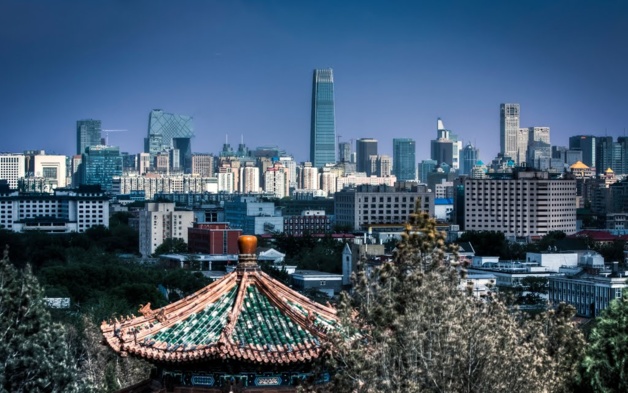
Skyline of Beijing | Crédits photo -- Sarmu/Panoramio
Notions of ancient tradition and culture continue to play an important role in the People’s Republic of China (PRC). This becomes especially apparent when visiting the Forbidden City, some of whose buildings date as far back as 1402. In the picture, you can see a painter working on the red walls in the Forbidden City. Coming to think of, these painters are probably not just responsible of the warm red of the walls, but also for the general vibrant impression of colours in historical Forbidden City.
What this photo then illustrates so well is how the PRC is repainting, reinventing its tradition. With much of its rich cultural heritage haven fallen, victim of the Cultural Revolution, and some of its treasures still in the Imperial Palace Museum in Taipei, Beijing resorts to making the most of what it is has, to promote its image in the world of culture and tourism.
What this photo then illustrates so well is how the PRC is repainting, reinventing its tradition. With much of its rich cultural heritage haven fallen, victim of the Cultural Revolution, and some of its treasures still in the Imperial Palace Museum in Taipei, Beijing resorts to making the most of what it is has, to promote its image in the world of culture and tourism.
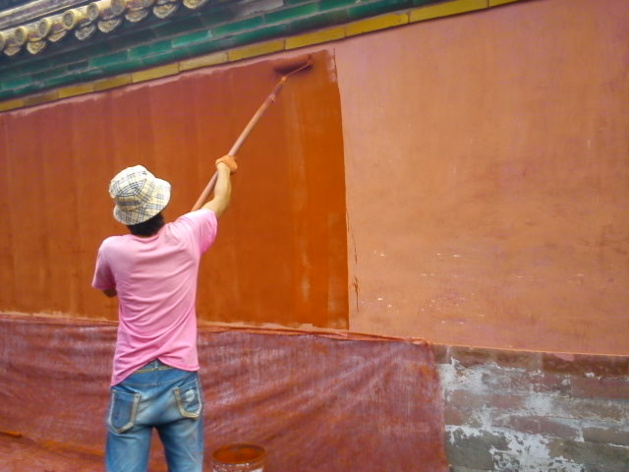
The well-organised subway system is certainly part of the greater scheme that aims to promote Beijing to tourists from all over the world. Different from the other public transportation systems in the PRC, where busses come at random because there is no time schedules for them and traffic conditions can be best described as chaotic, the subway is actually punctual and rather clean for Chinese standards. Although the Beijing subway is the oldest of its kind in the PRC, with the first line dating back to 1969, it is comparable in design to those in other major cities like Paris, New York or London. It owes much of it cosmopolitan character however to the heaps of municipal investment it received, as part of Beijing’s campaign for the 2008 Olympics.
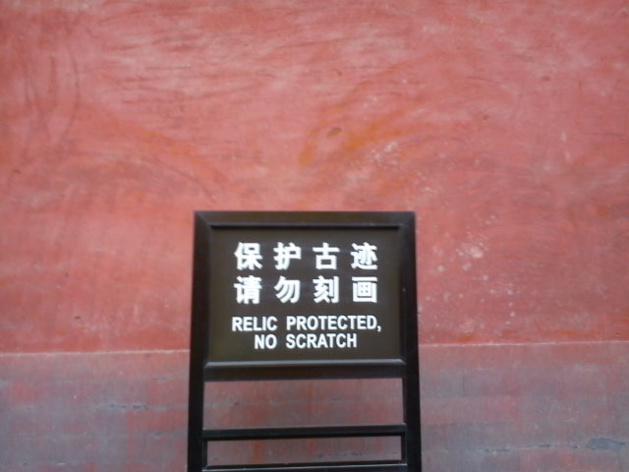
Another remainder from the Olympics are the more frequent English translations of signs in popular tourists areas. The "English" should however rather be referred to as "Chinglish" and can be commonly found on signs, T-shirts, notebooks, etc. Among the most amusing quotes encountered have been :"This is the most comfortable notebook you will ever run into. You will feel like writing with it all the time", a "I love flower" T-shirt and the sign above in the Forbidden City.
Oddly, even though English is very much in demand in the PRC, and native speakers can easily find teaching jobs especially with qualifications like TEFL a.o, the general proficiency continues to be rather low. Most staff especially outside the touristy areas, will not understand English, which is why knowing some Chinese is certainly an asset, especially if one wants to avoid having to resort to gestures for communication. Why given the rather poor English skills of some Chinese, companies do not check their English slogans and product inscription with native speakers remains a riddle – though the Chinglish will certainly continue to amuse.
Oddly, even though English is very much in demand in the PRC, and native speakers can easily find teaching jobs especially with qualifications like TEFL a.o, the general proficiency continues to be rather low. Most staff especially outside the touristy areas, will not understand English, which is why knowing some Chinese is certainly an asset, especially if one wants to avoid having to resort to gestures for communication. Why given the rather poor English skills of some Chinese, companies do not check their English slogans and product inscription with native speakers remains a riddle – though the Chinglish will certainly continue to amuse.
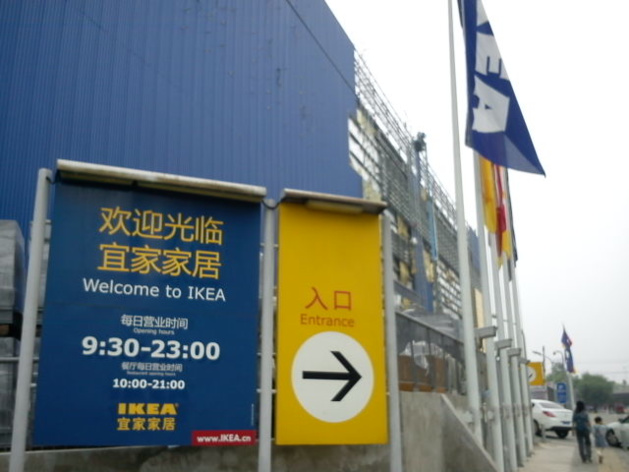
The one place that stood out for the correctness of English inscriptions has been IKEA, the Swedish home furnishing retail store – which in many aspects resembles its European counterparts. IKEA China is one of the amusingly "Western" places in China, though it is Western with Chinese characteristics.1 While the
restaurant offers the obligatory IKEA hotdogs and meatballs, they also have some more Chinese-sounding dishes like ‘Stewed Pork with Pre-served Vegetable’ on the menu.2 IKEA China has also retained the original names like Billy though of courses adding a Chinese phonetic equivalent (毕利) as well as a complete Chinese description followed by the price in Renminbi. IKEA is at least for Chinese price levels more on the pricy end – it is more targeted towards China’s middle class.
restaurant offers the obligatory IKEA hotdogs and meatballs, they also have some more Chinese-sounding dishes like ‘Stewed Pork with Pre-served Vegetable’ on the menu.2 IKEA China has also retained the original names like Billy though of courses adding a Chinese phonetic equivalent (毕利) as well as a complete Chinese description followed by the price in Renminbi. IKEA is at least for Chinese price levels more on the pricy end – it is more targeted towards China’s middle class.
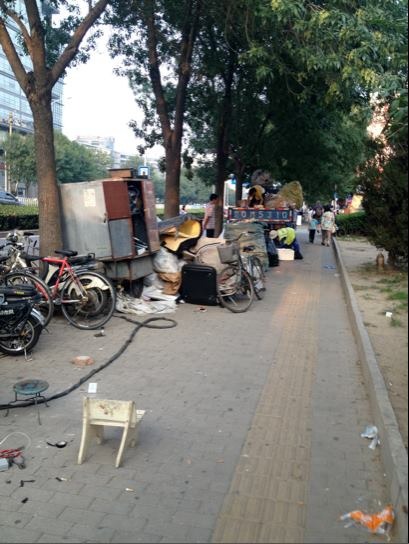
The one place that stood out for the correctness of English inscriptions has been IKEA, the Swedish home furnishing retail store – which in many aspects resembles its European counterparts. IKEA China is one of the amusingly ‘Western’ places in China though it is Western with Chinese characteristics.1 While the restaurant offers the obligatory IKEA hotdogs and meatballs, they also have some more Chinese-sounding dishes like "Stewed Pork with Pre-served Vegetable" on the menu.2 IKEA China has also retained the original names like Billy though of course adding a Chinese phonetic equivalent (毕利) as well as a complete Chinese description followed by the price in Renminbi. IKEA is at least for Chinese price levels more on the pricy end – it particularly targets China’s middle classes.
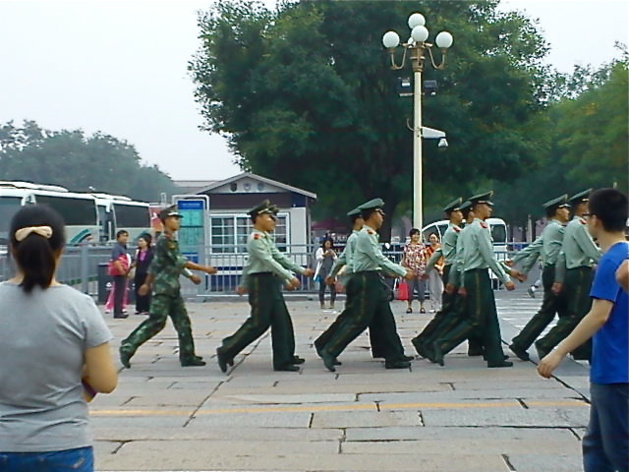
Walking on China’s streets, you also notice the constant presence of policemen making Beijing one of the safest capitals in the world. Especially at major tourist attractions like the Forbidden City or Tiananmen Square, you can be sure to encounter some of them. They tend to be quite helpful when you get lost because they know the area quite well and can help you find your way if you should get lost. The high number of state security forces however also serves as a constant reminder of there being a state concerned with its subjects’ activity. While the great firewall of China continues to block sites like Facebook or Twitter, Chinese people have their own equivalent of such sites called Renren and Weibo respectively. Conversely, what and especially to what extent touchy current affairs can be discussed on such platforms differs greatly from the "West". Chinese people have found their own ways however taking advantage of the fact that Chinese is a pictorial and tonal language, which opens opportunities widely unknown to people used to atonal, alphabet-based languages.
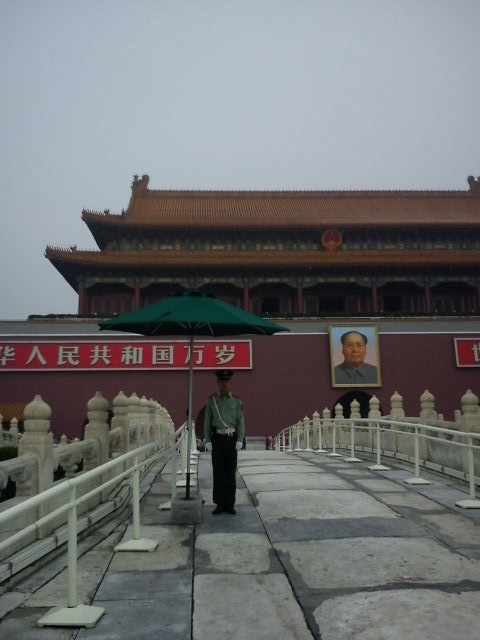
Concern about security seems to be omnipresent in China. The Beijing subway has CCTV cameras in operation, while many apartment complexes and even the universities also have their own security guards at the gate. Similar to security forces, pictures of the "Great Chairman"– Mao Zedong, are found frequently all over the city. Mao thrones not just above the entrance to the Forbidden City, on franchising articles like Mao bags or T-shirts, but is also on every Chinese Yuan note – regardless of the denotation. In contrast to Western historical writing, which tends to see Mao as one of the Great dictator usually mentioned in the same breath as Hitler and Franco, Mao is in China being celebrated as its founding father. Mao is often being displayed as having unified China – despite the fact that the unclear status of Taiwan on the international states continues to undermine this claim. While Mao certainly was not only the villain, as which he is commonly displayed by anti-communist Cold War historians who tend to place the emphasis on the failure of the Great Leap Forward and the violence of the Cultural Revolution, neither was he the God-like father figure as which he tends to be displayed in the PRC.
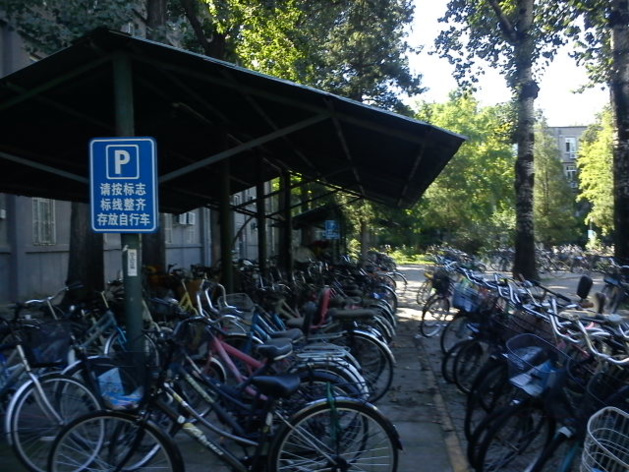
In his Talks at Three Meetings with Comrades Zhang Chunqiao and Yao Wenyuan, Mao stated in 1967 against the backdrop of the Cultural Revolution "in making revolution these days people demand this and that. When we made revolution from 1920 onwards, we set up first the Youth League and then the Communist Party. We had no funds, no printing press, no bicycles..." 4 China today has evolved not just in contrast to the early 1920s when Mao started off his protracted conquest of China’s hearts and minds but also beyond.
Especially looking at China’s economy, which though still being dubbed socialism with Chinese characteristics is seen by many as just that – capitalism. However, the booming economy and the large population increasingly raises the question of the social responsibility of the state for its people. After all, should a socialist state not also have a certain degree of obligation towards its people? Regardless of how one answers the "Is the PRC still communist-question", which is obviously connected to how one defines communism, the PRC has definitely changed from the 1920s at least in one aspect : bicycles are now very widespread, especially among students in the bigger Chinese cities.
Lire cet article en français
Especially looking at China’s economy, which though still being dubbed socialism with Chinese characteristics is seen by many as just that – capitalism. However, the booming economy and the large population increasingly raises the question of the social responsibility of the state for its people. After all, should a socialist state not also have a certain degree of obligation towards its people? Regardless of how one answers the "Is the PRC still communist-question", which is obviously connected to how one defines communism, the PRC has definitely changed from the 1920s at least in one aspect : bicycles are now very widespread, especially among students in the bigger Chinese cities.
Lire cet article en français



























